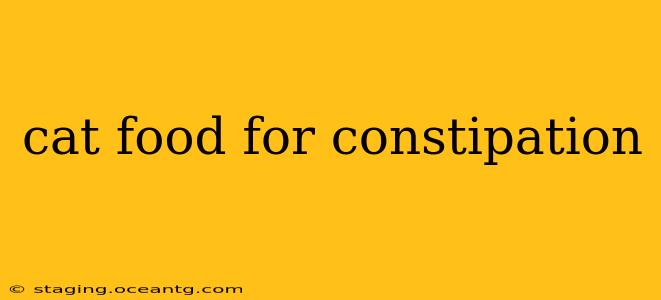Constipation in cats is a common problem that can cause discomfort and even more serious health issues if left untreated. While a change in diet is often a key part of the solution, choosing the right cat food can be tricky. This comprehensive guide will explore the best cat foods for constipation, explain the underlying causes, and offer preventative measures to keep your feline friend happy and healthy.
What Causes Constipation in Cats?
Before diving into specific food recommendations, it's crucial to understand what might be causing your cat's constipation. Several factors can contribute, including:
- Dehydration: Insufficient water intake is a major culprit. Cats aren't always great at drinking enough water, especially if they primarily eat dry kibble.
- Dietary Issues: A diet lacking in fiber can lead to hard, dry stools that are difficult to pass. Conversely, too much dry food without adequate moisture can also contribute to the problem.
- Lack of Exercise: Insufficient physical activity can slow down the digestive system.
- Underlying Medical Conditions: Conditions such as hyperthyroidism, diabetes, and kidney disease can also cause constipation. Always consult your veterinarian if constipation persists or is accompanied by other symptoms.
- Medications: Certain medications can have constipation as a side effect.
It's important to note: If your cat is exhibiting signs of constipation (straining during defecation, small or hard stools, decreased frequency of bowel movements, lethargy, vomiting), consult your veterinarian immediately. They can rule out any underlying medical conditions.
What Kind of Cat Food is Best for Constipation?
The ideal cat food for constipation will be high in fiber and moisture. Here's a breakdown of the best options:
High-Fiber Cat Food:
Look for cat foods that specifically mention "high fiber" on the label. These foods often contain ingredients like:
- Psyllium husk: A soluble fiber that adds bulk to the stool and promotes regular bowel movements.
- Wheat bran: Another excellent source of insoluble fiber that adds bulk.
- Beet pulp: A good source of both soluble and insoluble fiber.
These fibers help add bulk to the stool, making it easier to pass. However, it's important to introduce high-fiber food gradually to avoid digestive upset.
Wet Food (Canned or Pouched):
Wet food contains significantly more moisture than dry kibble, which is crucial for preventing constipation. The added moisture helps soften the stool and makes it easier to eliminate. Aim for a diet that's primarily wet food, supplementing with a small amount of dry food if necessary.
Foods to Avoid:
Avoid foods that are low in fiber and high in fillers. These can exacerbate constipation. Also, be cautious about introducing new foods suddenly, as this could upset your cat's digestive system.
How Much Water Should My Cat Drink?
Ensuring your cat drinks enough water is crucial in preventing constipation. Here are some tips:
- Provide fresh, clean water at all times: Make sure your cat always has access to multiple water sources in different locations.
- Consider a water fountain: Many cats are more enticed to drink from a flowing water source.
- Add water to wet food: Slightly moistening wet food can encourage your cat to drink more.
- Consult your vet: If you suspect your cat is dehydrated, your veterinarian can advise on appropriate hydration strategies.
What if My Cat's Constipation Persists?
If your cat's constipation persists despite dietary changes, it's essential to consult your veterinarian. They can perform a thorough examination to rule out any underlying medical conditions and may recommend additional treatments such as laxatives or enemas. Never attempt to treat chronic constipation with home remedies without professional veterinary advice.
Can I give my cat human laxatives?
No. Human laxatives are not suitable for cats and can be toxic. Always consult your veterinarian before giving your cat any medication, including laxatives. They can recommend a safe and effective treatment option specific to your cat's needs and health status.
My cat is constipated, what should I do?
If your cat is exhibiting signs of constipation, your first step should be to contact your veterinarian. They can help diagnose the underlying cause and recommend the appropriate treatment. While dietary changes (as described above) are often helpful, a vet visit is crucial to rule out any more serious medical problems.
This guide provides general information and shouldn't replace professional veterinary advice. Always consult your veterinarian for any concerns about your cat's health. They can provide personalized recommendations based on your cat's individual needs and medical history.
